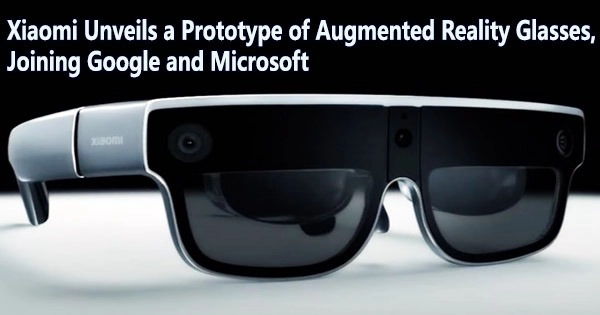Spain’s Barcelona In an effort to expand its product line beyond smartphones, Xiaomi unveiled a pair of prototype augmented reality glasses on Monday (February 27, 2023).
The device is called the Xiaomi Wireless AR Glass Discovery Edition. Digital media that can be placed over the actual world that a person is looking at is referred to as augmented reality.
Xiaomi said the glasses are just a concept technology and won’t be on sale yet. Its goal to penetrate the market, however, is highlighted by the announcement made at Mobile World Congress in Barcelona, the largest mobile industry trade exhibition in the world.
If Xiaomi officially launches the product, it will join the likes of Microsoft’s HoloLens and the Google Glass Enterprise as AR products on the market.
Technology giants including Google, Microsoft and Apple are interested in augmented or mixed reality as a way to bring new experiences to consumers. The technology is often described as being a key part of whatever the idea of a “metaverse” turns out to be.
“I think AR is a profound technology that will affect everything,” Apple CEO Tim Cook said last year.
Xiaomi’s new AR glasses feel more like a stake in the ground than a meaningful product launch. Chinese rivals including Oppo and TCL have also shown off AR devices and it’s clear no one wants to get left behind.
Leo Gebbie
Apple hasn’t officially acknowledged or launched any kind of virtual or augmented reality headset.
Bloomberg reported this year that Apple will unveil its mixed reality headset this spring, with consumer deliveries beginning in fall 2023.
“It’s a widespread view in the technology industry that AR smart glasses could be the next major form of mobile computing after the smartphone,” Leo Gebbie, analyst at CCS Insight, told CNBC via email.
Gesture control
Xiaomi said that its AR glasses are lightweight and connect to a smartphone wirelessly. Xiaomi also said the device offers “retina-level display” so users are able to see virtual objects as clearly as they would a physical object.
The Beijing, China-headquartered firm also said that wearers of the headset can use gesture control to carry out tasks. When wearing the glasses, users would raise their hands in front of them and then move their hands and fingers in a certain way to perform a function.
For example, Xiaomi said that “the thumb sliding on the index finger is used to enter and exit applications.”
The idea is that this could remove the need for you to touch your smartphone.
“This kind of interaction showcases one of the directions that Xiaomi believes human-computer interaction will take in the future,” the company said.
The company said that the headset will work with its Xiaomi 13 and 13 Pro, its flagship smartphones launched globally on Sunday.
Xiaomi, one of the biggest smartphone players in the world, is looking to unlock revenue from other devices. Over the past few years, the company has launched devices across the board from TVs to electric scooters.
“Xiaomi’s new AR glasses feel more like a stake in the ground than a meaningful product launch. Chinese rivals including Oppo and TCL have also shown off AR devices and it’s clear no one wants to get left behind,” Gebbie said.
















